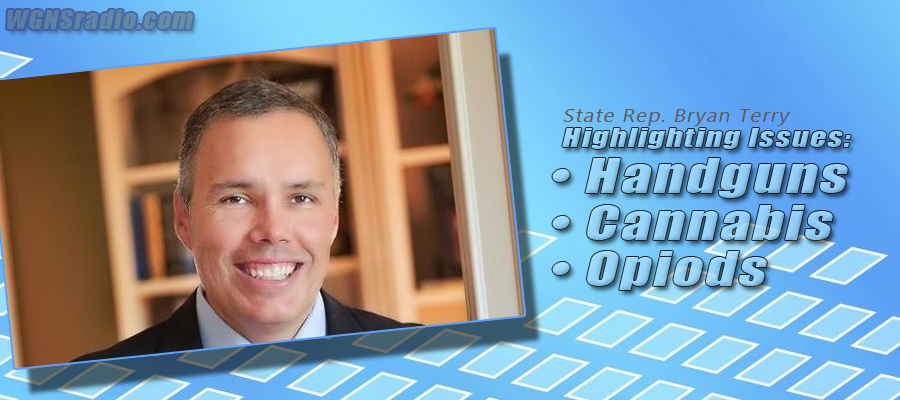The first half of the 112th Tennessee General Assembly, which saw significant progress and protections advanced for Tennesseans, has adjourned. Representative Bryan Terry, MD (R-Murfreesboro) had a successful session, contributing leadership and legislation that assisted the General Assembly towards a productive session. As Chairman of the House Health Committee, he helped pro-patient legislation navigate through the House while sponsoring and co-sponsoring significant legislation on a diverse set of issues that will impact Tennesseans in a positive manner.
“In some respects, this session was one of the more difficult sessions since I’ve been elected as we dealt with COVID-19, some contentious issues, and unaddressed issues from last year’s abbreviated session,” stated Terry. “On the other hand, it has been one of the more satisfying sessions as we have passed some significant pieces of legislation and helped Tennessee move forward.”
Rep. Terry opened the session by bringing awareness to the human rights violations occurring in China relative to organ harvesting and ended the session passing a medical cannabis bill. In between, he took on issues relative to opioids, the 2nd Amendment, rioting, and Temporary Assistance for Needy Families(TANF). In the end, Rep. Terry passed nine bills and several resolutions while co-sponsoring, amending, or impacting well over eighty other bills.
As chairman of the bicameral House and Senate TANF Working Group, Terry helped write HB 142, Governor Lee’s administration bill on TANF, and guided it through the House committee system. The legislation modernizes the TANF system by cracking down on fraud while providing a pathway to prosperity for TANF recipients. In addition, the bill sets up an evidence-based system for providing wrap around services to recipients in order to ensure Tennesseans can achieve upward income mobility.
Terry was, also, quite influential in advancing the protection of the 2nd Amendment Rights of Tennesseans. Terry was a prime co-sponsor of HB 786, which allows for permitless carry of a handgun for otherwise law abiding citizens, and a co-sponsor of HB 761, which provides a sales tax holiday on gun safes and gun safety devices in order to incentivize their utilization. “Protecting our 2nd Amendment rights was a priority of constituents and a priority in the General Assembly,” said Terry. “We took some important steps to push back against those wishing to infringe upon our rights.”
One of the steps was HB 1171, the Firearms Information Privacy Protection Act, or FIPPA, as it was known at the Capitol. FIPPA helps guard against firearm registration or confiscation at the federal level by creating a cause of action against an individual who provides information to the feds about a firearm owner for the purposes of gun registry or confiscation. In addition, if government personnel provide the information, they would be subject to a Class E felony. Terry, also, co-sponsored HB 902, which bans a state or local gun registry, and his amendment, which sets up an ouster should an elected official assist the federal government violate the Tennessee Constitution or law as it relates to firearms, got added to HB 928, the “Second Amendment Sanctuary Act”.
Protecting free speech while also protecting property rights and law enforcement were some of Terry’s goals this session. HB 881, the Mercenary Rioter Act, met those goals. The bill created penalties of aggravated rioting for individuals that are paid to riot or come in from out of state with the intent to commit a criminal offense and riot. “Tennesseans don’t want mercenary rioters creating dangerous situations for peaceful protesters, law enforcement, or business or property owners,” explained Terry. “If we can deter these bad actors, we can help protect Tennesseans.”
On the last day of session, Terry passed HB 490 which creates a medical cannabis commission and decriminalizes possession of 0.9% THC cannabis oil for patients with certain diseases, like cancer, Parkinson’s Disease or Sickle Cell Disease. After being unable to pass a more comprehensive medical cannabis bill that allowed for decriminalization of non-smokable, non-vapable, non-edible cannabis-based medicines, Terry resurrected HB 490 and drafted a bill which he was able to pass through seven committees in one day. Ultimately, he garnered the votes of both the Senate and the House, including the Lt. Governor and the Speaker of the House. “While the bill doesn’t take all the steps that patients need when it comes to cannabis-based medicines, it is a step forward for patients. I’m glad to be in a position to help Tennessee take that step,” concluded Terry.




















